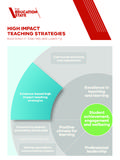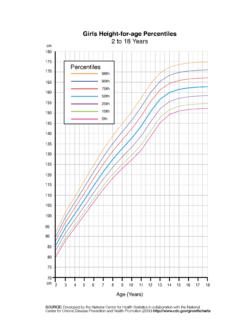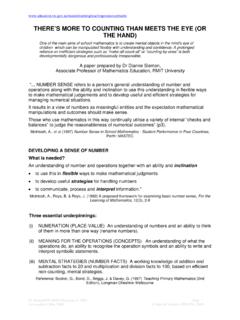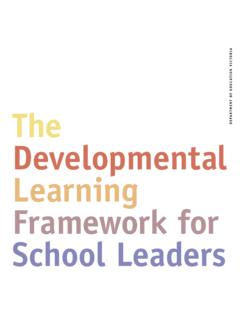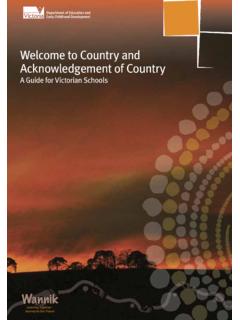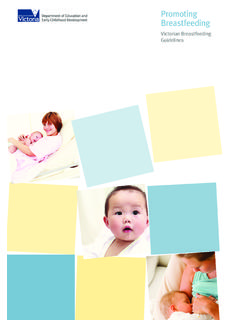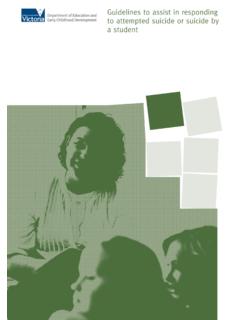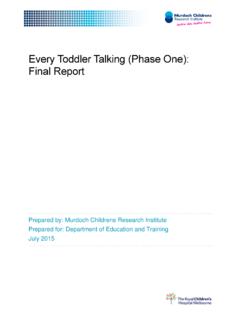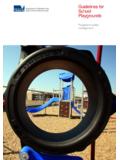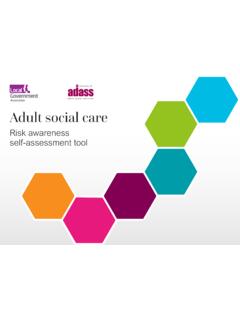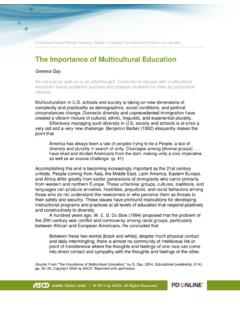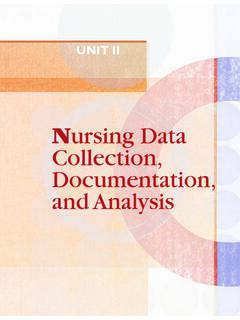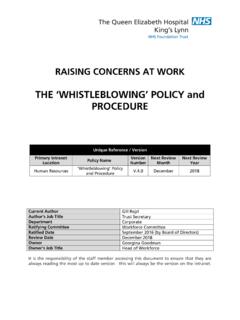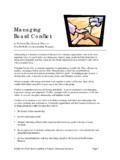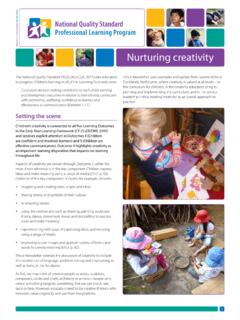Transcription of Practice Principle 5
1 Victorian Early Years Learning and Development Framework Evidence Paper Practice Principle 5: Respectful relationships and responsive engagement Authored for the Department of Education and Early Childhood Development by Caroline Cohrssen, Amelia Church & Collette Tayler 2 The Victorian Early Years Learning and Development Framework guides early childhood professionals Practice in Victoria. The Victorian Framework identifies eight Practice principles for Learning and Development ( Practice principles ). The Practice principles are based on the P-12 principles of Learning and Teaching, the pedagogy from the national Early Years Learning Framework, and are informed by the latest research. The Practice principles are interrelated and designed to inform each other.
2 They are categorised as Collaborative, Effective and Reflective: Collaborative 1. Family-centred Practice 2. Partnerships with professionals 3. High expectations for every child Effective 4. Equity and diversity 5. Respectful relationships and responsive engagement 6. Integrated teaching and learning approaches 7. Assessment for learning and development Reflective 8. Reflective Practice These Evidence Papers document the research that underpins each Practice Principle . The content of the Evidence Papers will be developed into a series of practical guides Practice principles in Practice which will provide practical advice to early childhood professionals on how to align their Practice to the Practice principles . 3 Practice Principle 5: Respectful relationships and responsive engagement Executive Summary.
3 4 Introduction .. 5 What do we mean by respectful relationships and responsive engagement ? .. 6 Responsive engagement with children .. 7 Respectful relationships with families .. 7 Why are respectful relationships and responsive engagement important in for children s learning and development and for effective teaching? .. 9 Respectful relationships and responsive engagement have been linked with specific learning outcomes that last over time.. 9 Warm and respectful relationships help children to establish secure attachments ..10 Respectful relationships and responsive engagement enable early childhood professionals to build on children s culture , strengths, interests and knowledge to take their learning and development forward..11 Respectful relationships and responsive engagement support sustained shared thinking.
4 11 How can we achieve best Practice ? .. 12 Children receive consistent care within their early childhood setting ..12 A culture of reflection within an early childhood setting supports professionals to become more responsive to children s culture ..12 Early childhood professionals share information about children s learning with the child s family and listen to each family s values, views and opinions ..13 Early childhood professionals recognise the diversity of the Australian community ..14 What are the implications for achieving best outcomes for children? .. 15 Methodology .. 16 References .. 18 4 Executive Summary The Victorian Early Years Learning and Development Framework is for all children in Victoria. Respectful relationships and responsive engagement is one of the eight Practice principles for Learning and Development of the Victorian Framework, and underpins effective Practice in early childhood.
5 This evidence paper presents the research to support this Practice Principle . Research has found that close relationships between early childhood professionals and young children actively support children s learning and development (see for example Howes, Burchinal, Pianta, Bryant, Clifford & Barbarin, 2008). Warm and trusting relationships with familiar adults enable children to form secure attachments to early childhood professionals, providing a secure base from which to take risks and explore their environment (Rolfe, 2004). Article 29 of the UN Convention on the Rights of the Child (UNCRC, United Nations 1989) describes children s right to have their cultural identity, language and values respected whether these values relate to the country in which the child is living or to the country from which the child may originate.
6 The Early Childhood Australia Code of Ethics (2006) describes various professional responsibilities which are based on the UNCRC. Both the UNCRC and the ECA Code of Ethics underpin this Practice Principle which is pivotal to professional Practice in early childhood education and care. Close relationships enable early childhood professionals to better understand individual children and their broader cultural contexts, which enable them to respond sensitively and appropriately to their individual needs (Powers-Costello & Swick, 2008). The implications for Practice informed by the research and detailed in this evidence paper are: Early childhood professionals develop and maintain respectful relationships and responsive engagement with children and their families.
7 Early childhood professionals develop warm, respectful relationships which provide a secure base, giving children confidence to explore and learn. Early childhood professionals develop an understanding of the broader context for each child. This enables them to develop learning programs that are responsive to each child and engage in conversations that are authentic and relevant to the child. Early childhood professionals create a culture of critical reflection, to understand the impact of their values and opinions on others; and to find effective ways to incorporate values and cultures of the community into their program. 5 Introduction When early childhood professionals develop respectful relationships with children and their families, they find out more about children s interests, skills and abilities.
8 This knowledge enables early childhood professionals to provide learning environments that respond to children s interests and needs, extend their learning and support their development. Early childhood professionals are encouraged to develop respectful relationships and engage responsively with children and families. The Victorian Framework states that: From birth, secure attachments formed through warm and respectful relationships with familiar adults are fundamental to children s learning and development. These relationships protect, regulate and buffer children. They provide a secure base that helps children to feel safe and confident to try new things. Interactions with children and families inform early childhood professionals knowledge of children s distinctive interests, skills, cultures and abilities.
9 This is crucial to providing positive experiences and a safe and stimulating environment that will encourage children to expand their capacities and deepen their knowledge and understandings. Early childhood professionals: initiate warm, trusting and reciprocal relationships with children provide safe and stimulating environments for children develop learning programs that are responsive to each child and build on their culture strengths and knowledge to take their learning and development forward understand, communicate and interact across cultures by being aware of their own world view respect the views and feelings of each child. VEYLDF, This evidence paper presents the research supporting Practice Principle 5: Respectful relationships and responsive engagement.
10 This Principle emphasises the importance of relationships between early childhood professionals, children and families that are sensitive and supportive. All children and families benefit from feeling welcome and valued in their early childhood settings, and this can be achieved when early childhood professionals make time to find out about children s and families opinions with a genuine interest. Getting to know families makes it possible for early childhood professionals to provide authentic play activities and to have relevant conversations with children (Joseph & Strain, 2004). Parents satisfaction with early childhood settings has been found to be linked with the sense that they (as parents) were 6 trusted and could trust in return, and that they would be listened to and treated with respect (Goodfellow, 2008).
